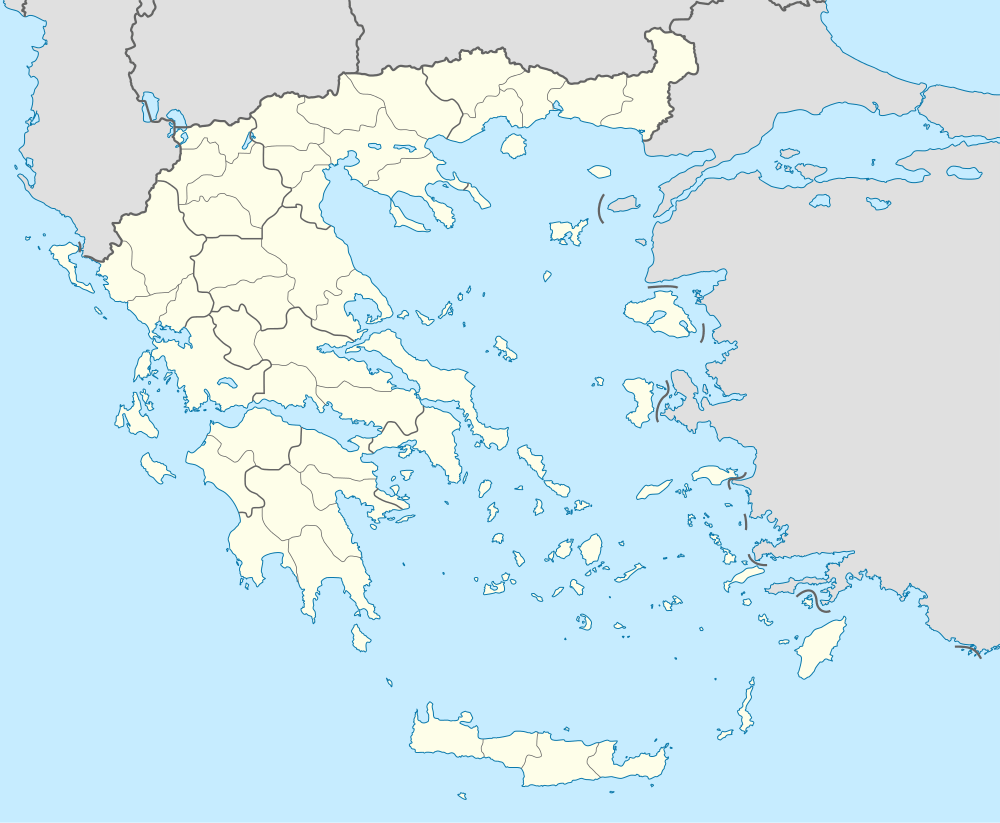Iolcos
| Iolcos Iωλκός | |
|---|---|
 Iolcos | |
|
Location within the regional unit  | |
| Coordinates: 39°23′N 22°59′E / 39.383°N 22.983°ECoordinates: 39°23′N 22°59′E / 39.383°N 22.983°E | |
| Country | Greece |
| Administrative region | Thessaly |
| Regional unit | Magnesia |
| Municipality | Volos |
| • Municipal unit | 1.981 km2 (0.765 sq mi) |
| Elevation | 156 m (512 ft) |
| Population (2011)[1] | |
| • Municipal unit | 2,138 |
| • Municipal unit density | 1,100/km2 (2,800/sq mi) |
| Time zone | EET (UTC+2) |
| • Summer (DST) | EEST (UTC+3) |
| Postal code | 385 00 |
| Area code(s) | 24210 |
| Vehicle registration | ΒΟ |
| Website | www.iolkos.gr |
Iolcos (/aɪˈɒlkɒs/; also rendered Iolkos or Iolcus /aɪˈɒlkəs/; Greek: Ιωλκός) is an ancient city, a modern village and a former municipality in Magnesia, Thessaly, Greece. Since the 2011 local government reform it is part of the municipality Volos, of which it is a municipal unit.[2] It is located in central Magnesia, north of the Pagasitic Gulf. Its land area is 1.981 km².[3] The municipal unit is divided into three communities, Agios Onoufrios (pop. 475), Anakasia (pop. 1012) and Ano Volos (pop. 651), with a total population of 2,138 (2011 census). The seat of the former municipality was the village of Ano Volos.
Mythology


According to ancient Greek mythology, Aeson was the rightful king of Iolcos, but his half-brother Pelias usurped the throne. It was Pelias who sent Aeson's son Jason and his Argonauts to look for the Golden Fleece. The ship Argo set sail from Iolcos with a crew of fifty demigods and princes under Jason's leadership. Their mission was to reach Colchis in Aea at the eastern seaboard of the Black Sea and reclaim and bring back the Golden Fleece, a symbol of the opening of new trade routes.
Along with the Golden Fleece, Jason brought a wife, the sorceress Medea—king Aeetes' daughter, granddaughter of the Sun, niece of Circe, princess of Aea, and later queen of Iolcos, Corinth and Aea, and also murderer of her brother Absyrtus, and her two sons from Jason. She is a tragic figure whose trials and tribulations were artfully dramatized in the much-staged play by Euripides, Medea.
The place of ancient Iolcos is believed to be located in modern-day nearby Dimini, where a Mycenaean palace was excavated recently .
Historical population
| Year | Population |
|---|---|
| 1991 | 2,415 |
| 2001 | 2,071 |
| 2011 | 2,138 |
References
- ↑ "Απογραφή Πληθυσμού - Κατοικιών 2011. ΜΟΝΙΜΟΣ Πληθυσμός" (in Greek). Hellenic Statistical Authority.
- ↑ Kallikratis law Greece Ministry of Interior (Greek)
- ↑ "Population & housing census 2001 (incl. area and average elevation)" (PDF) (in Greek). National Statistical Service of Greece.